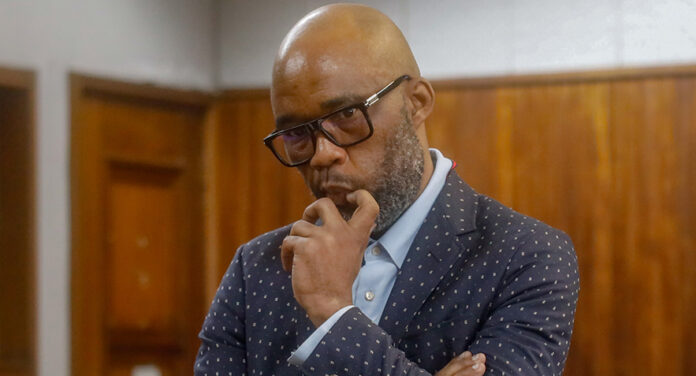Last Monday, in a judgment that reads like a masterclass in legal gymnastics, the Johannesburg High Court of South Africa’s Gauteng Division—presided over by Acting Judge Pieter du Plessis—upheld the denial of bail for Vusimuzi Matlala, a man accused of conspiracy to commit murder, attempted murder, and money laundering.
The case, which has garnered significant media attention, is a textbook example of the justice system’s ability to simultaneously flex its muscle and trip over its own feet.
Starting with the obvious: Regional Magistrate Syta Prinsloo applied the wrong legal standard in denying bail. Yes, you read that right. Prinsloo used the “exceptional circumstances” standard, reserved for more serious Schedule 6 offences, instead of the less stringent “interests of justice” standard applicable to Schedule 5 offences.
This glaring error was acknowledged not only by the state but also by the high court itself.
As the court put it, “Any court considering bail and refusing it, which places a higher legal burden than required by law on an applicant, prima facie failed to properly exercise its judicial discretion, and its decision will most likely be viewed by a court of appeal as wrong and should be replaced with the decision that should have been given.”
Textbook contradiction
But, in a move that would make any seasoned political spin doctor proud, the high court decided that the mistake didn’t matter because the outcome would have been the same anyway. Why bother with the rulebook when you can just wing it?
The court’s reasoning for denying bail is a masterstroke of contradiction. On one hand, it acknowledges Matlala’s strong personal circumstances—he’s a family man, a successful businessman, and a pillar of his community.
Quoting from the judgment: “The appellant is a 48-year-old married man who supports nine children and is self-employed as a director of four companies… that pay 94 employees almost R2-million in wages per month.”
On the other hand, it paints him as a flight risk, a potential witness intimidator, and a danger to society. The evidence for these claims? A mix of circumstantial allegations, a suspicious Eswatini identity card, and the discovery of a cellphone in his possession while in custody.
The court’s logic seems to be, “Basing these findings on the facts that the appellant is a flight risk, [and] he didn’t dispel the risk of interfering with witnesses or obstructing justice.”
Case circumstantial
And let’s not forget the state’s case, which the court itself admits is circumstantial and riddled with potential admissibility issues.
As the state confirmed, there is evidence of a conversation where Matlala allegedly admitted to a complainant that he was responsible for orchestrating the attempted murders in all three cases.
Yet, the court concedes, “The evidence against him, so admitted by the State, is circumstantial, meaning evidence that indirectly suggests a fact, rather than directly proving it.”
Despite this, the High Court insists that the allegations against Matlala—spanning three separate incidents—are serious enough to warrant his continued detention. The judgment reinforces, “The pattern of allegations across three separate incidents…suggests a repeated modus operandi involving targeted violence.”
But it also notes that “the trial court will be better positioned to deal with the state’s allegations and appellants’ denials,” and that the strength of the state’s case is not the bail court’s primary concern.
Different strokes for different folks
Then there’s the issue of fairness—or lack thereof. Matlala’s co-accused, who allegedly have direct evidence against them, were released on warning after being summoned to court. Meanwhile, Matlala, his wife, and another co-accused were arrested and forced to apply for bail.
Du Plessis acknowledges the “appearance of unfairness” but shrugs it off, citing the State’s discretion in handling arrests: “Yes, the appearance of unfairness is there; however, the State secures attendance of the accused at court by acting in accordance with sections 38 (1) and (2) of the CPA,” referring to the Criminal Procedure Act. In other words, it’s a classic case of rules for thee, but not for me.
The judgment also raises questions about the role of the justice system in high-profile cases. The court goes to great lengths to emphasise its commitment to impartiality: “This Court acknowledges the high public profile of the Appellant and the intense media scrutiny surrounding this matter,” adding that “This adherence to the Constitution and the law ensures that the integrity of the judicial process is maintained and that justice is administered to all parties without fear, favour, or prejudice, uninfluenced by public opinion or any considerations outside the law.”
Under the gaze
But let’s be real: in a case as high-profile as this, the court’s insistence on objectivity feels more like a defensive posture than a genuine commitment. After all, the court is well aware that its every move is being watched, dissected, and debated.
In the end, the judgment serves as a stark reminder of the power dynamics at play in the justice system. Matlala’s case is not just about the charges against him; it’s about the broader narrative of justice in South Africa.
It’s about who gets to wield power, who gets to evade it, and who gets caught in its crosshairs. And while the high court may have upheld the denial of bail, it has also exposed the cracks in the system—a system that is as much about politics as it is about justice.



